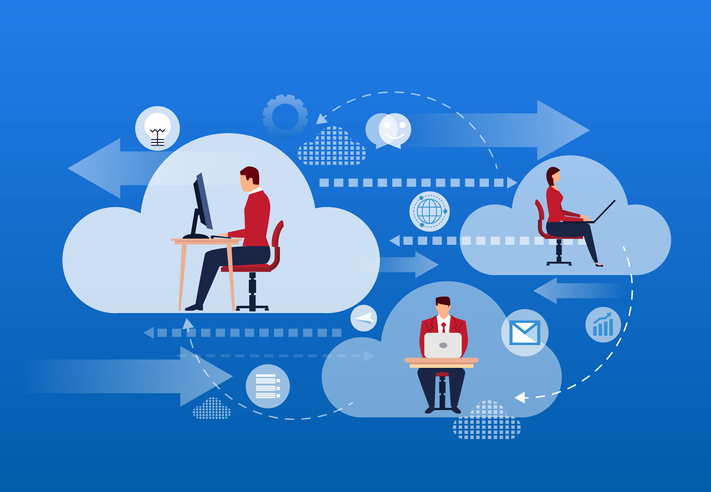No matter how secure you may be right now, you could always be doing more. Have you double-checked your cybersecurity lately? Review the best practices below to strengthen your small business cybersecurity.
When everything is going well, the last thing you want to do is think about what will happen when something goes wrong. It’s not necessary to dwell on the potential for a security disaster though – you know that it’s a possibility, so let’s just leave it at that. What’s important about this is that you know to cover your bases.
No need to assume the worst – just plan for it, so you know you’re protected. As that old saying goes, “An ounce of prevention is worth a pound of cure”.
Do what you need to do to “prevent” now, so you don’t have to pay for the “cure” later.
Use A Firewall
Your firewall is your first line of defense for keeping your information safe.
A firewall is a particular type of solution that maintains the security of your network. It blocks unauthorized users from gaining access to your data. Firewalls are deployed via hardware, software, or a combination of the two.
A firewall inspects and filters incoming and outgoing data in the following ways:
- With Packet Filtering that filters incoming and outgoing data and accepts or rejects it depending on your predefined rules.
- Via an Application Gateway that applies security to applications like Telnet (a software program that can access remote computers and terminals over the Internet, or a TCP/IP computer network) and File Transfer Protocol Servers.
- By using a Circuit-Level Gateway when a connection such as a Transmission Control Protocol is made, and small pieces called packets are transported.
- With Proxy Servers: Proxy servers mask your true network address and capture every message that enters or leaves your network.
- Using Stateful Inspection or Dynamic Packet Filtering to compare a packet’s critical data parts. These are compared to a trusted information database to decide if the information is authorized.
Train Your Staff
Your staff can have a significant effect on your cybersecurity – either they know enough to keep your assets secure, or they don’t, and therefore present a serious threat to your security.
So, which is it? Do your employees and volunteers have the knowledge they need to spot cybercrime scams, avoid common pitfalls and keep your data secure?
If you’re not sure, then they may need training. Security awareness training helps your employees and volunteers know how to recognize and avoid being victimized by phishing emails and scam websites.
They learn how to handle security incidents when they occur. If your employees and volunteers are informed about what to watch for, how to block attempts and where they can turn for help, this alone is worth the investment.
How Do I Train My Employees For Cyber Security?
A comprehensive cybersecurity training program will teach your staff how to handle a range of potential situations:
- How to identify and address suspicious emails, phishing attempts, social engineering tactics, and more.
- How to use business technology without exposing data and other assets to external threats by accident.
- How to respond when you suspect that an attack is occurring or has occurred.
Strengthen Your Passwords
Passwords remain a go-to tool for protecting your data, applications, and workstations.
They also remain a common cybersecurity weakness because of the careless way employees go about trying to remember their login information. Weak passwords are easy to compromise, and if that’s all that stands between your data in the cloud and in applications, you could be at serious risk for a catastrophic breach.
That’s why protecting your login processes with an additional layer of security – multi-factor authentication – is recommended. Multi-factor authentication requires the user to utilize two methods to confirm that they are the rightful account owner. It is an available security feature in many popular applications and software suites.
There are three categories of information that can be used in this process:
- Something you have: Includes a mobile phone, app, or generated code
- Something you know: A family member’s name, city of birth, pin, or phrase
- Something you are: Includes fingerprints and facial recognition
Protect Mobile Devices
Implement Mobile Device Management and Bring Your Own Device policies that allow employees to use their own devices in combination with the business’ without compromising your security:
- Require password protection and multi-factor authentication for mobile devices.
- Deploy remote access software that allows you to locate lost/stolen devices, and remotely wipe their data if need be.
- Develop a whitelist of apps that are approved for business data access.
And don’t limit yourself to desktops, laptops, and phones – there’s more out there for you to take advantage of. Have you considered what the Internet of Things and wearable devices can do for workplace efficiency? Now’s the time to get on board – up to 20.4 billion IoT devices will be online by 2020.
Manage Account Lifecycles And Access
This is one of the more basic steps on the list, but no less important. It can’t really be automated or outsourced to any technological aids; it’s just about doing the work. You need to have a carefully implemented process to track the lifecycle of accounts on your network.
- Follow a careful system for how accounts are created for new members, how their security is maintained and verified through their life, and how they are removed when no longer needed.
- Implement secure configuration settings (complex passwords, multi-factor authentication, etc.) for all accounts.
- Implement controls for login and use, such as lockouts for too many unsuccessful logins, unsuccessful login alerts, and automatic log-off after a period of inactivity
Protect Your Wireless Networks
Wi-Fi is a necessary part of doing business. Your staff cannot go without it, so it becomes your responsibility to make sure it’s secured, simple as that.
- Turn off broadcast so that your SSID is not available for others to see.
- Use WPA2-Enterprise security, which forces per-user authentication via RADIUS for access.
- Double-check your radio broadcast levels at default to make sure they don’t extend outside your building.
- Create a Guest Network that’s segmented and has a limited bandwidth so that those visiting your building don’t have any chance of access to your data.
- Monitor your network, and log events to track any activity by your employees and other contacts with network access.
Limit Unnecessary Physical Access
Your cybersecurity measures won’t amount to much if your laptops, tablets, smartphones and other devices are left out in the open for anyone to take.
It’s one thing for a cybercriminal to hack into your system remotely. It can be significantly easier if they’re doing so directly on a business device.
- Keep business devices under lock and key when not in use.
- Maintain a detailed inventory of who has authorized use for specific business devices.
- Don’t leave the login information on a sticky note on the keyboard of the device.
Follow Payment Card Best Practices
If you accept payment through credit and debit cards, make sure to follow established security policies and practices to mitigate any potential risks.
- Work with banks and other financial industry contacts to make sure you’ve implemented the right cybersecurity tools and anti-fraud services.
- Double-check your compliance requirements for FINRA, GLBA, and SOX.
- Segment networks involving a point of sales and payment systems from any unnecessary aspects of your IT infrastructure. No unnecessary software or web access should overlap with these systems.
![]()









